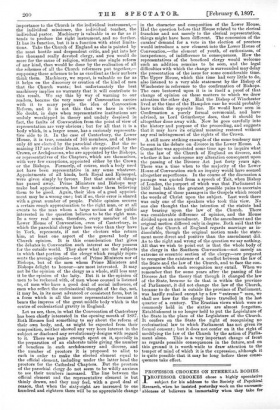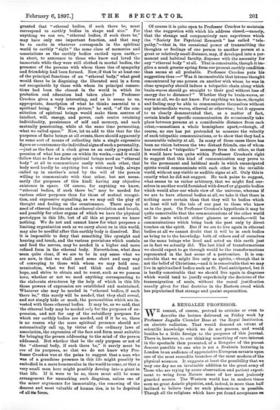PROFESSOR CROOKES ON ETHEREAL BODIES.
PROFESSOR CROOKES chose a highly speculative subject for his address to the Society of Psychical Research, when he insisted yesterday week on the unreason- ableness of believers in immortality when they take for
granted that " ethereal bodies, if such there be, must correspond to earthly bodies in shape and size." For anything we can see, "ethereal bodies, if such there be," may have only one important function, and that may be to excite in whatever corresponds in the spiritual world to earthly " sight " the same class of memories and associations as the earthly bodies excited upon earth,— in short, to announce to those who knew and loved the immortals while they were still clothed in mortal bodies, the presence of the persons with whom those ties of sympathy and friendship had been formed. Now, if thaii be at least one of the principal functions of an " ethereal body," what good would there be in disguising the liberated soul in a form not recognisable by those with whom its principal connec- tions had been the closest in the world in which its probation and education had taken place P Professor Crookes gives a very interesting, and as it seems to us, appropriate, description of what he thinks essential to a spiritual being. " His own picture," he said, " of the con- stitution of spiritual beings would make them centres of intellect, will, energy, and power, each centre retaining individuality, persistence of self and memory, and each mutually penetrating, while at the same time permeating, -what we called space." Now, let us add to this that for the purposes of finite beings at all events, there should apparently be some sort of means of collecting into a single expressive figure or countenance the individual signs of such a personality, —just as the face of a clock gives us an easily grasped im- pression of what has gone on within its works,—and it would 'follow that so far as finite spiritual beings need an "ethereal body" at all to communicate easily with each other, that body need hardly be anything but a visionary body, always -called up in another's mind by the will of the person willing to communicate with that other, but not neces- sarily (for purposes of this kind) having any objective existence in space. Of course, for anything we know, "ethereal bodies, if such there be," may be needed for
• various other purposes than for those of mutual recogni- tion, and expressive signalling, as we may call the play of thought and feeling on the countenance. There may be need of ethereal brains and an ethereal circulation and breath, and possibly for other organs of which we have the physical prototypes in this life, but of all this at present we know nothing. We do not and cannot know for what purposes a limiting organisation such as we carry about us in this world, may also be needful after this earthly body is dissolved. But it is impossible to deny that something like eyesight and hearing and touch, and the various provisions which sustain and feed the nerves, may be needed in a higher and more refined form in the ethereal body. Nevertheless, what does -seem quite clear, if we are to be in any sense what we are now, is that we shall need some short and easy way of conveying to those with whom we may hold com- munication, what we feel and think and dread and hope, and strive to obtain and to resist, such as we possess here, whether or not we need anything corresponding to the elaborate structures by the help of which in this life those powers of expression are established and maintained. Whatever else may be needed in "ethereal bodies, if such 'there be," this surely will be needed, that they shall reveal, and not simply hide or mask, the personalities which are in- -vested with those ethereal bodies. It may be, as we said, that 'the ethereal body may be needed only for the purposes of ex- pression, and not for any of the subsidiary purposes for which our earthly bodies are needed, and if it be so, there is no reason why the mere spiritual presence should not automatically call up, by virtue of the ordinary laws of association, the expression of the face and form most suitable for bringing the person addressing to the mind of the person addressed. But whether that be the only purpose or not of the " ethereal body, if such there be," it surely must be -one of its purposes, so that we do not know why Pro- lessor Crookes was at the pains to suggest that a man who was of a grandiose presence in this life might possibly be embodied in a mere homunculus in the world to come, or that a very small man here might possibly develop into a giant in that life. If it were to be so, there must still be some -arrangement for unmasking such disguises, unless one of -the minor arguments for immortality, the renewing of the ,dearest and most valuable of human ties, is to be deprived .of all its force.
Of course it is quite open to Professor Crookes to maintain that the suggestion with which his address closed,—namely, that the strange and comparatively rare experience which the "Society for Psychical Research " has called " tele- pathy,"—that is, the occasional power of transmitting the thoughts or feelings of one person to another person at a great or relatively small distance, may, if developed into a per- manent and habitual faculty, dispense with the necessity for any " ethereal body " at all. That is conceivable, though it im- plies a much greater spring from our present earthly condition than seems at all probable. Professor Crookes puts his suggestion thus :—" Was it inconceivable that intense thought concentrated by one person on another with whom he was in close sympathy should induce a telepathic chain along which brain-waves should go straight to their goal without loss of energy due to distance P " Whether they be brain-waves, or waves at all, we do not know. For anything we know, thought and feeling may be able to communicate themselves without any intermediate waves, ethereal or otherwise ; but it appears to us clearly demonstrated that, as a matter of fact, certain kinds of specific communication do occasionally take place between persons at a considerable distance from each other,—sometimes a whole hemisphere apart,—though, of course, no one has yet pretended to measure the velocity of such telepathic communications, or to show that they had a measurable velocity at all. In many of these cases there has been no vision between the two distant friends, one of whom has received a "telepathic" message from the other, so that it would have been quite within Professor Crookes's right to suggest that this kind of communication may prove to be the permanent and habitual mode in which emancipated spirits would communicate with each other in the invisible world, without any visible or audible signs at all. Only this is exactly what he did not suggest. He took pains to suggest, what seems to us rather arbitrary, that we might find our- selves in another world furnished with dwarf or gigantic bodies which would alter our whole view of the universe, whereas if we are to have ethereal bodies at all, we take it that there is nothing more certain than that they will be bodies which at least will tell the tale of our past to those Who knew us in the past. On Professor Crookes's hypothesis it may be quite conceivable that the communications of the other world will be made without either glances or sounds,—will be communications which bring back the past only by direct touches on the spirit. But if we are to live again in ethereal bodies at all we cannot doubt that it will be in stitch bodies as bring us to the knowledge both of others and of ourselves as the same beings who lived and acted on this earth just as in fact we actually did. The last kind of transformations we should expect to go through would be the transformations represented in the last scene of a pantomime. It is con- ceivable that we might live only as spirits,—though that is not the belief of Christians,—and it is conceivable that we may live in spiritualised bodies such as St. Paul anticipated, but it is hardly conceivable that we should live again in disguises which would tend to justify superficially the doctrine of the transmigration of souls, without the moral justification usually given for that doctrine in the Eastern creed which has popularised that strange and quaint superstition.







































 Previous page
Previous page